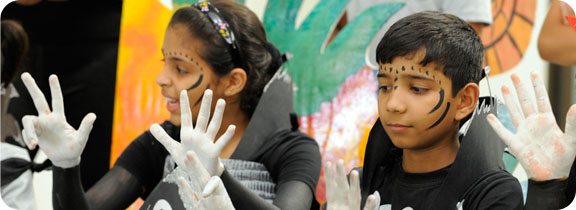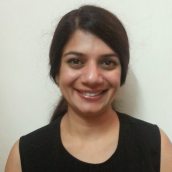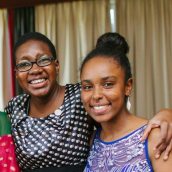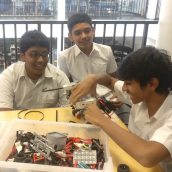Vasanthi Thandlam: Lifelong learning and giving
An active volunteer for Operation Smile, an international charity group that helps children with cleft palates around the world, Vasanthi trained at the Operation Smile head office in Norfolk, Virginia, USA and has been passionately promoting the cause for five years. She started an Operation Smile club at the American International School Chennai with a small group of high school students who went on to participate in various local and international medical missions.
Now, Vasanthi will be accompanying a team of Indian students to Vietnam to make presentations on various health modules. These not only teach prevention and basic health knowledge but also help reshape everyday habits of people with unhealthy lifestyles. Health education is an effective tool to improve health in developing nations. In the future, she hopes to bring Operation Smile to the Aga Khan Academy Hyderabad.

What Makes Us Unique
The Aga Khan Academies are an integrated network of about 18 residential schools in 14 countries in Africa, South and Central Asia, and the Middle East. They are dedicated to expanding access to the highest standard of education for exceptional young men and women, regardless of their ability to pay.
The Academies are more than just residential schools that strive to give their students a sound academic foundation. Each school emphasises the importance of academic excellence while instilling in students a sense of civic responsibility, leadership skills, and the desire, ability, and commitment to give back to their communities locally and globally.
The Academies are grounded in an educational approach that measures success not just by academic achievement, but by how students apply what they know to make the world a better place.
Students receive a grounding in ethics and also develop openness towards difference and acceptance of pluralism by living in diverse communities. As the network of Academies develops, both students and teachers will participate in visits and exchanges to Academies in other countries and regions.
Aims of the Academies programme
Our programme aims to:
- build inquiring, tolerant and creative minds
- empower gifted individuals, including girls, to innovate and lead
- over time, educate a cohort of well-trained local leaders with a sound ethical outlook and great intellectual capacity
- establish a global learning community across diverse geographic, social, economic, religious and tribal boundaries by providing needs-blind and merit-based admissions
- develop highly trained and effective educators
- positively influence education broadly across the targeted regions of the world, with measurable impact.
“The Aga Khan Academies aim to create ethical leaders with a strong sense of civic responsibility who will go on to the best universities in the world, pursue careers of their choice and…become leaders in the governments and the institutions of civil society in their own countries, in international organisations and in all those institutions, academic, economic and artistic that create positive change in our world.”
Embedded in our programme, the Aga Khan Curricular Strands (AK Strands) aim to strengthen understandings and outlooks needed by leaders of the future.
They encompass five critical areas of study:
- Ethics
- Pluralism
- Cultures (with an emphasis on Muslim civilisations)
- Governance and Civil Society
- Economics for Development.
The AK Strands examine issues of global importance and are also tailored to the cultural context of each Academy. This allows students to engage with international issues and challenges while remaining strongly grounded in their local context.
The Times of India: Civil society has to be driven by competence as well as ethics: Aga Khan
In light of the inauguration of The Aga Khan Academy, Hyderabad, The Times of India reporter Ranjan Roy interviews His Highness the Aga Khan and focuses on his unique and forward thinking vision, which includes ethics, free-market economics, and civil society as essential elements of a well-rounded education.
Ivy Akinyi: Video spotlight
Introducing Ivy, a student at the Aga Khan Academy Mombasa. Her innate drive for self-growth and desire to give back to the community makes her a true home-grown leader.
Erica Byenkya (Class of 2014): Contributing to society with love and generosity
Erica Byenkya, who is a fourth-year student at Saint Mary’s University in Halifax, Canada, is a graduate of the Aga Khan Academy Mombasa. Since leaving the Academy in 2014, Erica has been pursuing a Bachelor of Commerce degree at the university with a double major in marketing, and computer and information systems. She is expecting to graduate from the university in May 2019.
“I think that my Academy experience was vital in my success in university so far,” Erica says confidently. The Academy, she says, nurtured within her a love of volunteering that helped her make connections and friends, and also ensured that she remained connected to her local community. “I think that we were definitely more focused on encouraging independence and community service than the schools attended by other students,” Erica comments. The experience of living in residence at the Academy, she says, also helped her become more self-sufficient and taught her how to take care of herself – this was useful when she moved to Canada for higher education.
At the university, Erica has worked through three work terms as part of the cooperative education programme. In these three terms, she has worked as a marketing coordinator for a software development company and at a non-profit organization focused on encouraging students and faculty in the sciences. She has also taken up volunteer work, including with a local after-school youth programme and as the public relations representative of the Saint Mary’s African Student Society (SMASS). She is currently preparing for her second year with SMASS.
Erica is also doing well in her academic work. She received an entrance scholarship from Saint Mary’s University, which was increased last year due to academic achievement. Erica commends her counselors at the Academy: “I had a very hard time writing my personal statements for my university applications and I know that without the help of my counselors I wouldn’t have been accepted into all the universities I applied to.”
At the Academy in Mombasa, Erica was one of the founders of a service group that aimed to support local farmers in the area by consulting with them about their families’ needs and fundraising to help meet those needs. Through their efforts in the first year they helped one family send their youngest children to school, build a small shop to sell their wares and buy new seeds. The service group also helped pay the exam fees of the entire graduating class of a local school so that they could all sit their final exams.One of the many things Erica misses at the Aga Khan Academy Mombasa is her wonderful friends. “I’m still in contact with some of them online but being able to spend so much time with them was a gift I’m very thankful for,” she says. Her most unforgettable experience at the Academy which she is very proud of was learning to play the violin, which according to her was the most difficult to learn among other musical instruments. She fondly remembers her teachers: Mrs. Mwandawiro, her dorm mother and chemistry teacher, and Mr. Dudi, whom she calls “my wonderfully dramatic English teacher.” “They both pushed me very hard because they had high expectations for me, and while I did not perform as well as I’d hoped in chemistry, their expectations always encouraged me,” she says.
Erica chose to participate in the International Baccalaureate (IB) program because she felt, and still feels, that it offered her greater flexibility in her choices for the future. “With the national curriculum you are restricted to three subjects in your final two years but I was unsure about the career path I wanted to take and so I really appreciated being able to further study interesting subjects in the IB program while deciding what I wanted to do with my future," she remarks.
Erica says her future plans after graduating from the university is to stay and work in Canada for a while and then eventually make the decision about whether to pursue a post graduate degree. “I do see myself coming back to Uganda but before that happens I would like to travel more.” When asked what would she focus on to improve the lives of people in her country if she had all the resources at her disposal, Erica hoped that one day she could contribute to the renovation of the Ugandan library system so that it could benefit all the citizens of Uganda, especially the young students whose schools may not have large libraries or who seek safe and productive spaces to spend their free time.
Rudra Potluri - dreaming up the future
Rudra has grown into himself since joining the Academy in 2013, most notably through the enrichment programme through which he discovered robotics and design. His work with robots stems from his enthusiasm for engineering, but Rudra has gone beyond just tinkering. “When I was learning robotics as part of enrichment, I never imagined that I would become captain of a robotics team,” said Rudra. Rudra captained a robotics team in January 2018 at the FIRST Lego League competition in Bengaluru. This was the first ever robotics competition that Academy students entered in.
“It didn’t stop there,” he continues, “the Academy provided a platform for me and my team to share our learning and knowledge with the community by letting us conduct a workshop for government schools.” Rudra was part of a team that hosted 48 grade six students for a day, teaching them about robotics and design. “The most unique thing about the Academy is that it doesn’t just stop at teaching, it makes sure that students apply their knowledge in the real world and give something back to society.” Rudra also participated in the Chinna Shodha Yatra, travelling around rural Andhra Pradesh to understand nuances of life in local communities.
In 2014, India's ambitious Mars Orbitor Mission came to fruition and Rudra had the opportunity to take part in a live telecast discussion about the mission on state TV. The following year, Rudra was selected as a Microsoft student ambassador and got to attend a workshop at the Microsoft headquarters in New Delhi. In grade 10, he used his MYP personal project as a chance to explore his interests in engineering and software and built a home automation system. "My aim was to make it for my grandparents, who are older and can’t move around as easily anymore,” he says about the Smarthome Automation System. His SAS, at ₹2,000 per room, is a cost effective alternative to existing systems in the market, which can cost upwards of ₹70,000. In the same year, Rudra showed initiative in his design project, choosing to build a quadcopter. The drone was created to support the Academy's existing security system.
In May 2018, outside robotics events, Rudra also headed the IT and design unit of the Academy’s first ever TEDx. It comes as no surprise then to know that Rudra is considering studying computer engineering after school. Rudra has applied to the Michigan Institute of Technology (MIT) in the USA, and the University of Waterloo, Canada.
Rudra earned a fellowship to spend the 2018 summer vacation in Ryerson University, Toronto, to take part in the Ryerson DMZ Sandbox Basecamp, a workshop for socially conscious young innovators. The urban university is a renowned research institution and we are positive Rudra's contribution will be significant and impactful.
Aga Khan University workshop: Friday 2nd - Saturday 3rd March
Welcome to the 40 participants who will take part in discussions on civil society in the Indian subcontinent led by eminent scholars from India and England.
Symposium Dinner with Aga Khan University - 6:30pm, Friday 2nd March, Academy Building basement
Panel discussions on themes of civil society and development followed by moderated Q&A session and dinner. Open to all students & staff.
Symposium Dinner with Aga Khan University - 6:30pm, Friday 2nd March, Academy Building basement
Panel discussions on themes of civil society and development followed by moderated Q&A session and dinner. Open to all students & staff.
Videos
The Aga Khan Academy Maputo is committed to developing future leaders by delivering Excellence in Education. We offer merit-based admission to our International Baccalaureate (IB) programme at our purpose-built world-class campus in Maputo, Mozambique. Watch our newly released video to learn more about our unique offering.
The International Baccalaureate featured the Aga Khan Academies and our approach to creating home-grown leaders as part of their 50th anniversary commemoration. Watch to learn how the Academies work to transform the communities in which they are located.
This is Abdirahman, a student at the Aga Khan Academy Mombasa. During his time at the Academy, he explored his wide-ranging abilities and developed an initiative that helped change the lives of young girls in Mombasa.
Meet Abdalla, a Somali student from the Aga Khan Academy Mombasa. He shares his journey of self-discovery: Abdalla solidified his multiple identities, fostered his strengths, and created positive social change during his years at the Academy.
Women and girls are strong, fearless, courageous, limitless, and powerful. The Aga Khan Academy Hyderabad celebrated International Women's Day on 8 March 2018 with this video.
Video by AFD – Agence Française de Développement about how children at the Aga Khan Academy Maputo "Dare to Dream Big" in their new school facilities. The Aga Khan Academy in Maputo, Mozambique has been growing since it opened its doors in 2013. The second phase extension was completed in early 2018 and included bigger classrooms, extended outdoor play areas, a library, an art room and a science lab.
This is Mercy, a teacher at the Aga Khan Academy Mombasa who joined through the Teacher Preparation Programme. Mercy fosters profound and meaningful relationships with everyone around her and consistently encourages her students to be the best versions of themselves.
Meet Sadiq, a student at the Aga Khan Academy Mombasa. Open-mindedness, confidence and time management are some of the many characteristics he has developed at the Academy that will help him achieve his dream of becoming a journalist.
Meet Saumya, a student at the Aga Khan Academy Mombasa. A musician and a leader, she shares her wisdom on what it means to make a true positive impact.
Introducing Ivy, a student at the Aga Khan Academy Mombasa. Her innate drive for self-growth and desire to give back to the community makes her a true home-grown leader.
Meet Felix, a student at the Aga Khan Academy Mombasa. With a keen early interest in science, he shares his dreams for the future and explains how the Academies have helped foster his ambitions.
This is Stephen, a student at the Aga Khan Academy Mombasa. His passion for community service shines as he expresses the growth in perspective he experienced through his education at the Academy.
A day at the Aga Khan Academy Mombasa's Junior School, seen through the eyes of the students.
Students and teachers from the Aga Khan Academy Hyderabad are featured in this film from the International Baccalaureate about the Middle Years Programme.
This film by the International Baccalaureate highlights the impact being made by students from the Aga Khan Academy Hyderabad through a service initiative at a local government school.
July 2017 video showing progress on the construction of the Aga Khan Academy Maputo's campus.
The aim of the Aga Khan Academies is to develop future leaders with the skills and knowledge to support positive development in their societies. The Academies achieve this by recruiting exceptional young people from all backgrounds and providing them with the highest international standard of education.
The Aga Khan Academies are a global network of schools that produce future leaders who are ethical, effective and pluralistic.



